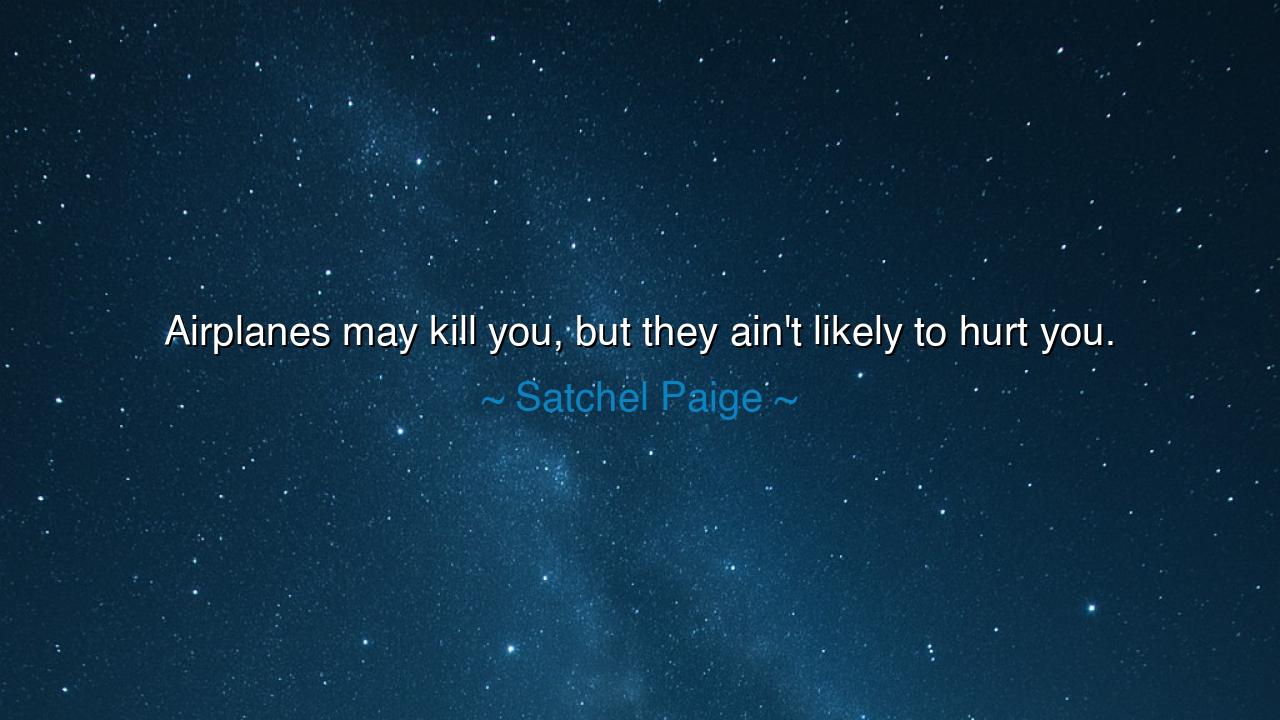
Airplanes may kill you, but they ain't likely to hurt you.






Hearken to the words of the great pitcher Satchel Paige, who with wit and wisdom declared: “Airplanes may kill you, but they ain’t likely to hurt you.” At first, these words seem but the playful jest of a man unafraid of heights and machines. Yet when spoken by one who faced struggle, adversity, and the storms of life itself, they ring with a deeper truth. He was not merely speaking of airplanes, but of fear, of risk, and of the strange way in which the mind trembles before dangers that are more imagined than real.
In these words we hear the wisdom of one who knew the harshness of fate. Satchel Paige, who pitched through the hardships of segregation and yet rose to greatness, had little patience for unnecessary worry. He understood that many dangers in life are vast in imagination but rare in reality. The airplane seems terrifying, for should it fail, the end is final—but how seldom it fails! The hurt, the daily stumblings and sufferings, come not from the soaring heights but from the small, ordinary trials of life. Thus, his words teach us: why fear the rare and distant catastrophe, when the real burdens we face are those of each passing day?
The ancients knew this lesson well. Consider the story of the Spartans at Thermopylae, who stood against the Persian host. They did not fear death, for it was certain; they feared only dishonor, for that wound cuts deeper and lasts longer. Likewise, Satchel Paige reminds us: death itself may come like the fall of an airplane, swift and unyielding, but it is not the daily torment. The true pain lies in living in fear, shrinking from opportunities, and letting imagined threats cripple the spirit.
There is also humor here, born of strength. To jest in the face of danger is itself an act of courage. The man who can laugh at death has already conquered it in his heart. By declaring that an airplane may kill but not hurt, Paige mocked the frailty of fear. He lifted the burden of worry from his listeners, showing them that life is too brief to tremble at shadows. To fear constantly is to suffer wounds that never come; to laugh is to live freely until the very end.
We may also see in his words a call to live boldly. How many avoid journeys, opportunities, or great leaps forward because they fear the unknown? How many remain bound to the ground, never daring to rise, because they fear the sky? Yet Paige’s wisdom tells us: take the flight, live the adventure, pursue the dream. The risk of great harm is small, but the risk of regret is immense. Better to soar and fall than to never leave the earth at all.
Think too of the explorers of old—Columbus, who sailed into unknown seas, or the first pilots who braved the skies. They knew that danger was real, yet they pressed on, for they understood that discovery lies on the other side of fear. Without such courage, no new lands would have been found, no new paths carved, no new dreams fulfilled. Paige’s jest, then, becomes a hero’s call: do not be paralyzed by dangers that rarely come, but step boldly into the arena of life.
Thus the teaching is clear: fear is often the greater enemy than danger itself. The hurt of hesitation, the pain of lost chances, the sorrow of roads never taken—these are wounds that linger far longer than the rare strike of fate. Life will one day end for us all, but until that day, it is not death we should fear, but wasted living.
Therefore, let your action be this: when faced with the unknown, do not tremble before it. Take the journey, embrace the challenge, lift your eyes to the horizon. Do not ask, “What if it kills me?” but rather, “What if I never try?” Live with courage, laugh at fear, and remember the wisdom of Satchel Paige: life is too precious to be wasted worrying about what may never come.






AAdministratorAdministrator
Welcome, honored guests. Please leave a comment, we will respond soon